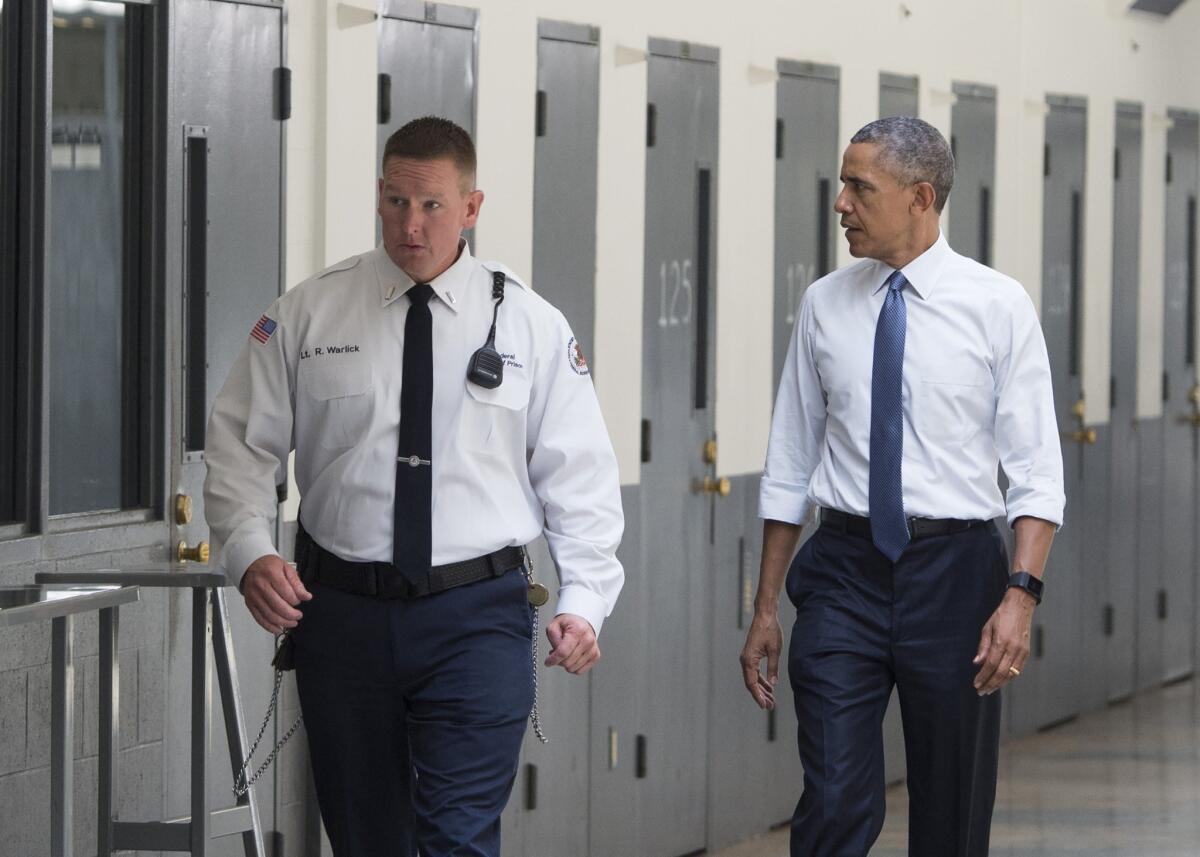Obama becomes first president to visit prison, but reform push has limits

President Obama, with a correctional officer, tours El Reno Federal Correctional Institution in Oklahoma on Thursday.
- Share via
Reporting from Washington — President Obama has made a push for broad-based reform of the criminal justice system in recent days, commuting the sentences of 46 inmates and, on Thursday, becoming the first sitting president to visit a federal prison.
“We’ve got to be able to distinguish between dangerous individuals who need to be incapacitated and incarcerated versus young people who ... if given different opportunities, a different vision of life, could be thriving,” he said after meeting with six drug offenders at the El Reno Federal Correctional Institution outside Oklahoma City.
As ambitious as his goals are, the changes Obama can make are limited.
The majority of criminal cases in the U.S. are handled by state and local prosecutors, and even more will likely fall to them if Obama orders the Department of Justice to change how it files charges as part of the reform he seeks.
Part of Obama’s push for change will be to try to influence those decision-makers at lower levels of government. In considering giving federal prosecutors greater discretion in how they charge cases, he would try to steer states to do the same. The tactic has worked before: Some state and municipal officials heeded Obama’s call for increased minimum wages.
“A lot of this ... is going to have to happen at the state level,” Obama said. “My goal is that we start seeing some improvements at the federal level and we’re then able to see states across the country pick up the baton.”
The climate is favorable, with crime at historic lows and Republicans including Sen. Rand Paul of Kentucky, a presidential hopeful, also backing aspects of criminal justice reform. Even former President Clinton admitted this week that the crime bill he signed into law worsened the problem of prolonged prison sentences. On the campaign trail, Hillary Rodham Clinton is among several candidates who have called for legal reforms, a marked shift from a time when any serious contender for the White House had to be adamant about being “tough on crime.”
Obama’s effort also seizes on the growing grass-roots call for changes in the justice system that began last summer with violent protests in Ferguson, Mo.
He wants to reduce long mandatory minimum sentences or get rid of them altogether, while also giving judges more discretion in sentencing nonviolent crimes and prosecutors more latitude to seek the lightest penalties they find effective.
Still, such moves are limited in scope. Senior administration officials also say alternatives to prison, including drug courts, treatment and probation programs, save thousands of dollars per defendant each year, but that’s the type of change that would take an act of Congress.
Though both Republicans and Democrats on Capitol Hill back aspects of criminal justice reform, many lawmakers are hostile to Obama’s overtures and he is unlikely to ever get a bill to sign that would enact broader reforms.
“Probably his best tool is the bully pulpit to talk about race in the criminal justice system,” said Jon Gould, professor of public affairs and law at American University. “He can try to change the conversation. Challenge cultural norms and expectations. Change the national discussion and, potentially, the mood.”
It’s an argument that even some conservatives find persuasive.
“Right now the federal government spends billions of dollars incarcerating individuals while doing little or nothing to address the underlying cause,” said Sen. John Cornyn, a Texas Republican and sponsor of a new measure based on the experience of officials in his home state.
“Instead of just building more prisons and hoping that would somehow fix the problem,” he said, “they decided to try a different approach – scrapping construction plans and instead funding recidivism-reduction programs” like job training, drug rehabilitation and mental health treatment.
The number of commutations issued by the administration was, said Gould, “a drop in the bucket.”
“They’re using a cautious set of criteria,” he said, “because they understandably don’t want people to call him soft on crime.”
Hours after Obama announced his commutations, House Judiciary Chairman Bob Goodlatte (R-Va.) and 18 Republican members of his committee sent a letter to Atty. Gen. Loretta Lynch asking questions about the specific crimes and backgrounds of the offenders.
What were their gang and organized crime affiliations? Firearm convictions and prior convictions? Victims?
At the El Reno prison, Obama visited a 9- by 10-foot cell, inspecting its bunk beds and marveling at the tiny space allotted for three “full-grown men.”
He met with six inmates serving time for drug offenses, talking about their crimes and the life circumstances that led to them.
He acknowledged that there’s little he can do to directly affect the system that put them there. But as in his appeal to the NAACP earlier in the week, he called gently for compassion. Many of the crimes committed by inmates at El Reno are not that different from the bad decisions of his own youth, he said.
“There but for the grace of God,” he said. “And that is something that we all have to think about.”
For more White House coverage, follow @cparsons
More to Read
Sign up for Essential California
The most important California stories and recommendations in your inbox every morning.
You may occasionally receive promotional content from the Los Angeles Times.











